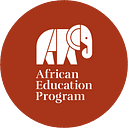Growing Read for Rose, Our Way
 JJulie-Anne Savarit-Cosenza
JJulie-Anne Savarit-Cosenza
Co-founder & Executive Director
African Education Program
Last Sunday was a very special day for the Read for Rose Special Education Program. As part of the International Day for People with Disabilities, the girls and boys in our program showcased their incredible talents through poetry and songs at an annual celebration hosted by the Kafue District Administration’s Office. It was truly heartwarming to see them united in action, working towards the achievement of the Sustainable Development Goals for persons with disabilities.
Participating in events like these is not only important for the children in our program, but also for the visibility and influence of our flagship Learning & Leadership Center in Kafue, Zambia, named Amos Youth Centre.
We believe in advocating for broader change at Zambia’s national level. And a powerful way to achieve this is by showcasing the abilities and achievements of our girls and boys.

One of the things I love most about my job is the leadership strengthening and vision honing work with the co-directors of the Learning & Leadership Center. Febby Choombe, the co-director who leads the Read for Rose Special Education Program, has an incredible vision for transforming the education landscape for children with disabilities. Her approach focuses on empowering the children to live independent lives and become changemakers in their communities. We don’t see their disabilities as limitations, but rather, we celebrate their abilities.
I recently read that UNESCO estimates that fewer than 10% of African children with known disabilities attend school. *
Great progress has been made to give all children an education, yet 90% of children with disabilities in low income countries still do not receive an education. Inclusive education has widely been recognized as the best way to educate children with disabilities. It empowers children to learn side-by-side with the other children from their communities, helping challenge stigma around disability from an early age. This approach is essential to the social, emotional and functional development of children with disabilities. An inclusive education is a necessary precondition for a life of social acceptance, independence and a quality livelihood — that’s why Febby makes sure girls and boys at Read for Rose take part in activities with the children and youth within the Learning & Leadership Center.
Knowing that there is so much need in Zambia and across Africa, sometimes our pilot program at Read for Rose feels too small given the astounding success it has had in enhancing the children’s and their families’ lives.
But we are committed to growing as we always have, favoring quality programming over quantity, and sticking to our holistic approach. We understand that supporting the entire family is crucial for the success of the children in our program. You can click here to read one of the many stories of success.
Watching a parent, who just learned sign language, learn to communicate with their child for the first time, in THEIR own language, was incredible. Chilufya, a 7-year-old boy with hearing loss at Read for Rose, is taking sign language lessons with his mother, Mirriam. He has made it his responsibility to teach his older brothers sign language too. The newly found language has mended the communication barrier that existed between Chilufya and his family. You can read this story by clicking this link.

Expanding the Read for Rose Special Education Program is a top priority for us. We want to reach more girls and boys, providing them with the same opportunities for growth and success. By doing so, we can continue to make a difference in their lives and in the communities they belong to.
To expand, we need both financial and material resources, as well as other like-minded organizations and collaboratives, so our impact is collective and systemic. This way, together, we are working towards a future where every child, regardless of their abilities, has the opportunity to thrive and become the best version of themselves.
